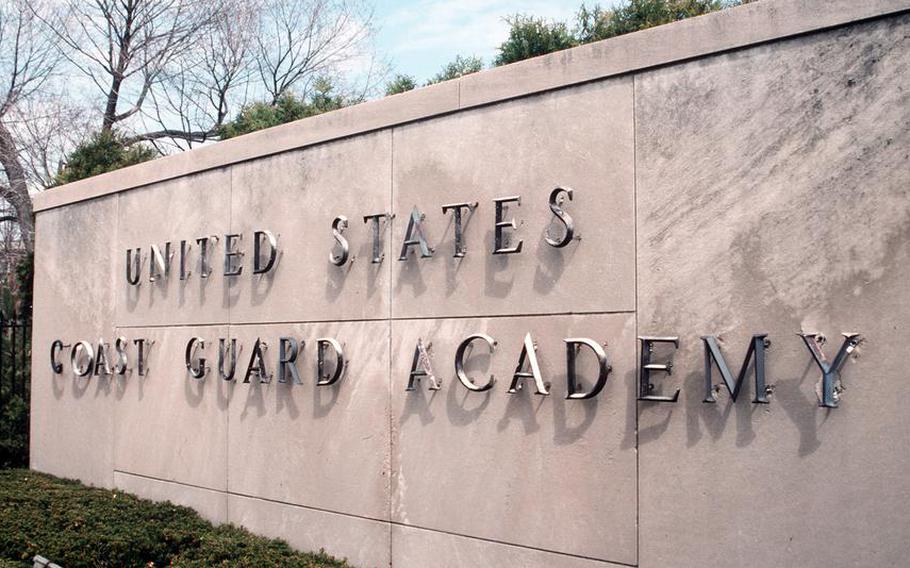
The U.S. Coast Guard Academy in New London, Conn. (David M. Santos/U.S. Coast Guard)
Thirteen former cadets of the U.S. Coast Guard Academy are seeking $10 million each from the service, accusing the Coast Guard of failing to implement adequate policies and practices that allowed sexual violence to go unchecked, according to legal documents filed Thursday.
The 12 women and one man who filed the claims wrote in separate documents about rape, hazing and physical violence at the academy in New London, Conn. While some said the abuse led them to leave the academy and end their military careers before they fully began, others said they went on to join the Coast Guard where they were again sexually assaulted.
“Today’s filings are just the tip of the iceberg. We know that there are numerous women and men who were sexually assaulted at the Coast Guard Academy and have never gotten justice,” said Christine Dunn, an attorney for the 13 former cadets. “We know that there is strength in numbers and hope that bringing legal claims on behalf of multiple survivors is an important step in holding the Coast Guard Academy accountable for failing to keep cadets safe.”
Service officials confirmed they received the claims but said federal law prevents them from discussing the details.
“The Coast Guard will resolve the claims in accordance with the Federal Tort Claims Act and any other applicable law. Sexual assault and sexual harassment have no place in our service,” the service said in a statement.

Crew members aboard the Coast Guard Cutter Alex Haley conduct helicopter operations in the Bering Sea near Alaska on Jan. 8, 2024. (U.S. Coast Guard)
The legal filings follow a year of scrutiny for the Coast Guard Academy that began with the revelation that the service concealed a report that found academy officials had routinely mishandled reports of sexual assault among cadets. The report, known as Operation Fouled Anchor, was the result of a six-year internal review of 102 reports of sexual assault and harassment cases at the academy between 1990 and 2006.
Fouled Anchor’s existence only became public after CNN learned of the report and the decision in 2020 to not release it. Only then did Coast Guard officials go to Congress with it. Congressional committees and the Department of Homeland Security inspector general have since opened investigations into the cover-up, and the Coast Guard Investigative Service has begun criminal investigations into the cases included in Fouled Anchor.
One woman who filed a claim Thursday described being asleep in her bed at the academy when a fellow cadet climbed onto her while he was naked. She fought him and pleaded with him to stop as he began to rape her. Finally, she told him that she feared pregnancy and was not on birth control. He stopped the physical assault but remained at her bedside and performed a sexual act.
An academy policy required cadets to keep their doors unlocked, and it was known among cadets that she did not have a roommate, according to the complaint.
“I had seen other women be discharged while their assailant was allowed to continue their service. I wanted to be an officer and graduate, so I did not report [the attack],” the woman wrote in the complaint.
The man who filed a claim said he was hazed by fellow cadets until it escalated into sexual violence. When he confided in a counselor at the academy, he was told “things like that don’t happen to real men.”
“The lasting emotional scars from my time at the academy have greatly impacted my well-being,” he wrote. “The trauma has caused a strain on my personal relationships and led to two of my marriages failing. The emotional distress and [post-traumatic stress disorder] also make it difficult to sleep. I often wake up at 3 a.m. screaming and throwing punches.”

Adm. Linda Fagan, commandant of the Coast Guard, testifies at a House Committee on Homeland Security hearing on July 24, 2024. (Joe Gromelski/Special to Stars and Stripes)
Each complaint was filed anonymously and made available with the dates redacted by the two law firms representing the 13 former cadets, Sanford Heisler Sharp LLP and Maritime Legal Solutions, PLLC. The claims are the first step in filing a lawsuit under the Federal Tort Claims Act, a federal statute that permits individuals to bring legal claims against federal agencies. Prior to filing a complaint in court, it must first go through an administrative process with the agency being accused.
The 13 claims are filed against the Coast Guard, the Department of Homeland Security and the Department of Transportation, which oversaw the Coast Guard until 2003.
“For far too long, the Coast Guard has relied on a culture of silence, fear and retaliation to keep survivors from seeking accountability for the horrific injustices they faced as cadets. By filing these complaints, our clients are bravely coming forward, together, to get the justice they sorely deserve,” said Ryan Melogy, another attorney representing the former cadets.
Sen. Richard Blumenthal, D-Conn., was the lead author of a report about the Coast Guard scandal released last month by an investigations subpanel of the Senate Committee on Homeland Security and Governmental Affairs. He said the failure to address sexual assault and harassment in the ranks is a service-wide problem that must be addressed through transparency and by holding accountable those who allowed it to persist.
So far, no Coast Guard leaders have been disciplined. Adm. Linda Fagan, the commandant of the service, told Blumenthal and the subpanel that she plans to review the findings of the inspector general before moving forward with accountability. She has conducted her own review and began implementing 33 actions to improve the Coast Guard’s culture and handling of sexual misconduct.